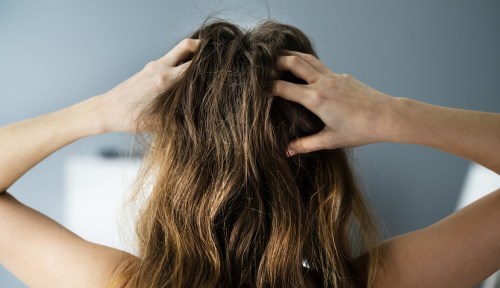Our editors independently select these products. Making a purchase through our links may earn Well+Good a commission
If you’re currently in the throes of an itchy scalp, you know how uncomfortable—not to mention annoying—it can be.
Experts in This Article
double board-certified dermatologist and dermatopathologist at Medical Dermatology &
board-certified dermatologist at Schweiger Dermatology Group
board-certified dermatologist at Medical Dermatology and Cosmetic Surgery in New York
Scalp itchiness is actually quite common, says Brendan Camp, MD, a Manhattan-based dermatologist at MDCS Dermatology, and it often comes with scalp irritation, redness, flaking, and sensitivity.
The most common cause is seborrheic dermatitis (aka dandruff), Dr. Camp says, which is marked by pink, dry, flaky patches of skin. It’s not clear exactly what causes seborrheic dermatitis, but “it tends to be worse in the winter and may be exacerbated by stress,” Dr. Camp notes.
Other causes of an itchy scalp include the following, according to the American Academy of Dermatology (AAD):
- Contact dermatitis: An itchy, flaky rash on your scalp could be an allergic reaction to a new hair- or skin-care product (think: shampoo or hair dye). The itch and rash tend to go away when you stop using the offending product.
- Scalp psoriasis: If you have the skin condition plaque psoriasis, it can flare up on your scalp, causing itchiness along with silvery-white scales and dandruff-like flakes.
- Atopic dermatitis: This type of eczema can cause redness and scales on the scalp, often with a burning sensation, and it’s best treated with the help of a dermatologist.
- Lice, scabies, or ringworm: Head lice and scabies are caused by tiny bugs that invade your scalp, while ringworm is a fungal infection. All three require a diagnosis and often need a prescription treatment to go away.
More rarely, an itchy scalp could be due to a nerve problem (especially if you don’t see a rash or other outward signs) or skin cancer—both should be treated by a dermatologist.
Whatever’s causing your scratching, you’re probably looking for some relief. Here, dermatologists share their best at-home remedies for an itchy scalp.
1. Zinc pyrithione
This is the active ingredient commonly found in over-the-counter anti-dandruff shampoos and treatments, and it can be effective in relieving symptoms of an itchy scalp. Thanks to its antifungal properties, it can help control the growth of Malassezia, a yeast-like fungus that can exacerbate dandruff and seborrheic dermatitis, explains Erum Ilyas, MD, a board-certified dermatologist with Schweiger Dermatology in Philadelphia. It also has anti-inflammatory effects, which can help soothe and calm the skin on your scalp.
There are plenty of brands to choose from, but Dr. Ilyas recommends Head & Shoulders Classic Clean Daily Shampoo ($27.88 for a 2-pack, Amazon) and DHS Zinc Shampoo. ($12.71, Person & Covey).
2. Charcoal
Charcoal has become a popular ingredient in products targeting excess oil or impurities (both of which may lead to itchiness), Dr. Ilyas says.
“Charcoal applied to the skin is harmless and is not likely to irritate the skin, but it may possibly absorb extra oil from the skin,” she says.
She recommends this treatment for people who have an oily scalp, as it is a milder alternative to help reduce the oiliness without excessively drying the skin or hair.
Try Briogeo’s Scalp Revival Charcoal + Coconut Oil Mico-exfoliating Shampoo ($42, Amazon) along with the brand’s Scalp Revival Charcoal + Tea Tree Scalp Serum ($32, Amazon).
3. Coconut oil
Thanks to its moisturizing, soothing, and antimicrobial properties, coconut oil can work wonders on a dry, itchy scalp. Research, including one March 2021 study in Scientific Reports, shows that coconut oil is effective at reducing both fungus and dandruff.
You can buy coconut oil in many places, including your local grocery store. Simply warm a small amount of it in your hands or over a low stove until it becomes a liquid and then apply it directly to the scalp (make sure it’s not too hot before you put it on your skin!). Massage the oil gently into your scalp with your fingers and focus on areas that are particularly itchy or irritated.
4. Apple cider vinegar
An apple cider vinegar rinse is yet another effective itchy-scalp remedy that has been used for centuries.
“It has both antioxidant and antimicrobial properties, which has helped those suffering with itchiness associated with scalp psoriasis,” says Marisa Garshick, MD, dermatologist at Medical Dermatology & Cosmetic Surgery in New York City. She suggests rinsing with a 1:1 ratio—one part apple cider vinegar and one part water—every week.
“Definitely ensure a thorough rinse of the scalp to make sure you’re reaping the antimicrobial benefit,” she notes.
5. Tea tree oil
Tea tree oil has become one of the most common ingredients found in skin care products—and for good reason. “It is known for its antimicrobial and antiseptic properties in its activity against bacteria, viruses, fungi, mites, etc.,” says Dr. Ilyas. “When added to scalp exfoliators, it is likely to address some of the underlying triggers for scalp inflammation that result in scaling and itching.”
Try Chamuel’s All Natural Tea Tree Balm ($16.47, Amazon) or Pharm to Table Scalp Relief Tea Tree Leave-In Conditioner ($14, Amazon).
Dr. Ilyas cautions, though, that tea tree oil comes with a 1 to 2 percent chance of causing contact dermatitis. For this reason, you may want to test the product on a small patch of skin first, to see if you have a reaction. And if you use a product with tea tree oil but your itching gets worse, stop using the product right away.
6. Salicylic acid
This longtime topical acne treatment has the ability to break apart superficial skin cells to help remove dead skin from the surface. “In scalp products, it can help remove excess dry skin and scale,” notes Dr. Ilyas, which can help tame itchiness.
“The great thing about salicylic acid is that it can be effective without being too irritating,” she adds.
Try Act+Acre’s Cold Processed Scalp Renew Exfoliator ($48, Amazon), which helps exfoliate the scalp of flaky skin, combat excess oil, and relieve scalp itch and sensitivity.
7. Aloe vera
Aloe vera extract has been used medicinally since ancient times to help soothe the skin and treat burns and cuts, notes Dr. Ilyas, thanks to its anti-inflammatory and hydrating properties. It can work wonders on the scalp when you apply it directly in gel form, whether it’s store bought or straight from the source.
She recommends massaging the aloe vera gel gently into the scalp, focusing on areas that are particularly itchy or irritated. Let it sit for at least 10 minutes to gain the most benefits before rinsing out.
8. Baking soda
Would you believe that a simple kitchen staple like baking soda could be the answer to your scalp itchiness? Baking soda can help exfoliate the scalp and remove dead skin cells that may contribute to itching, explains Dr. Ilyas. Think of it like a natural way to “detox” your scalp.
An easy at-home remedy is to mix a tablespoon of baking soda with lukewarm water to form a simple paste that you can then massage into your scalp. Be sure to rinse thoroughly with water before shampooing and conditioning as usual.
9. Oatmeal
Have you ever noticed that oatmeal is a popular ingredient in anti-itch creams and lotions? There’s good reason for this. Oatmeal has anti-inflammatory properties and can help soothe the skin—including an itchy scalp.
Simply use a food processor to grind up some rolled oats into a fine powder and then mix it with water to form a paste. Apply the paste to your scalp and leave it on for 20 to 30 minutes before rinsing it out.
What to avoid on an itchy scalp
Your scalp is still your skin, so you can easily aggravate it if you’re using the wrong products or ingredients. Dr. Camp recommends avoiding undiluted essential oils to the scalp. “Essential oils need to be diluted in a carrier oil or shampoo, otherwise the high concentration of oil can cause scalp irritation and further exacerbate the problem,” he says.
He also recommends avoiding the use of undiluted apple cider vinegar to the scalp, as it can cause a reaction that causes redness, swelling, pain, and worsening itch.
Also, pay attention to how often you’re washing your hair. “It can be helpful to wash the hair regularly and consistently to prevent buildup but not wash too often, as this can lead to dryness and itching,” says Dr. Garshick.
When to see a doctor about an itchy scalp
It’s best to see a doctor if the itchiness persists despite at-home remedies, worsens, or affects your quality of life. You’ll also want to make an appointment if you think the culprit is eczema, scabies, or ringworm, so your doc can draw up a treatment plan.
“While there are some shampoos and hair care products that can help to relieve an itchy scalp, it can help to be evaluated by a dermatologist as, depending on the cause, there may be some prescriptions that can help, such as prescription shampoo or topical steroids,” Dr. Garshick says.
FAQ
1. Why is my head itching so badly?
There are multiple causes for an itchy scalp, including dry scalp, seborrheic dermatitis (dandruff), or contact dermatitis (an allergic reaction to certain products). Other factors that may contribute include under- or over-washing your hair, seasonal or environmental changes, and a history of skin conditions like eczema or psoriasis, explains Dr. Garshick.
“As the season changes, the scalp can also experience more dryness as a result of decreased moisture in the environment,” she says. “Also, if you are experiencing an itchy scalp, it’s important to pay attention to any hair products you are using, as this can be a result of an allergic reaction or irritation.”
2. How do you hydrate an itchy scalp?
Scalp skin can be hydrated by using a gentle shampoo free of dyes, fragrances, and sulfates because these ingredients can sometimes cause skin irritation and dryness, explains Dr. Camp. Plus: “Use a conditioner or mask that helps restore moisture to the scalp and hair shafts, such as one that contains hydrating ingredients like avocado, jojoba, argan, or olive oil,” he says.
3. What oil is good for an itchy scalp?
Several oils can be helpful for an itchy scalp, including coconut oil and tea tree oil, both of which offer moisturizing, soothing, and antimicrobial properties.
4. What is the best shampoo for an itchy scalp?
The best shampoos for an itchy scalp contain active ingredients that help soothe a dry scalp while reducing irritation. Dr. Garshick recommends Dove Dermacare Scalp Anti-Dandruff Shampoo ($4.74, Amazon), which contains pyrithione zinc to fight dandruff and reduce flaking, while still being gentle on the scalp. “It’s a good option for those with dandruff who are also experiencing dry scalp, as it also nourishes the scalp and is pH balanced, so won’t leave the scalp feeling stripped or dry,” she says.
Sign Up for Our Daily Newsletter
Get all the latest in wellness, trends, food, fitness, beauty, and more delivered right to your inbox.
Got it, you've been added to our email list.











